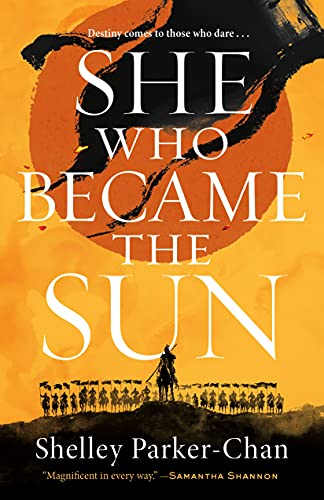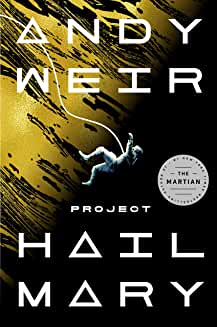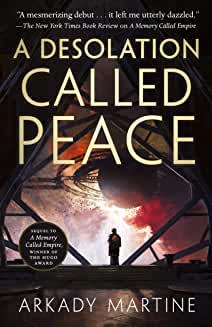By Michaele Jordan: You may remember that a couple of weeks ago, I posted (or rather I started to post) my personal take on the Hugo nominees for Best Novel, but I only got through the first three. So here I am, back with the remaining three candidates.
The next book in the line-up was She Who Became the Sun, by Shelley Parker-Chan (Tor / Mantle). I loved it. Just loved it. This book is glorious. Ms. Parker-Chan says that, having despaired of finding a decent translation of the Chinese historical sagas that she loved, she decided to write her own. And that is what this is.

The story is sprawling and complex, driven by characters who are all simply trying to get what they want. Sometimes what they want may seem unreasonable to us, but to them, that’s not a meaningful objection. They don’t have to justify what they want, they just want it. If they can, they will even fling armies around and slaughter thousands to get it.
Although the bulk of the characters are either women or damaged men, it is well over a hundred pages before anyone happens to notice that the inferior status and cruel treatment of women (and others) is perhaps unfair. The insight is shrugged off. In the medieval Chinese world, justice is not a meaningful concept. It’s simply non-existent. Parents are not just. Kings are not just. Life is not just. Even heaven is not just. Most women are far too busy trying to survive to concern themselves with the fairness, or lack thereof, of their situation. It is what it is.
For example (and this is not a spoiler, it’s chapter one) the protagonist, a little girl, is practically the only girl-child in her village. The land has been trapped in drought and famine for her entire life. Food is always short. When a family doesn’t have enough food for all the children, it is not shared. It is given to the son. The daughter just doesn’t get any. So she starves.
It is a testament to her family’s prosperity that they still have a surviving daughter. She helps the little boys dig up crickets to supplement the family diet. (She’s actually much better at it than her brother.) When she gets home, her parents take the crickets away and give them to her brother. This was horrible, of course. But it was horribly truthful. Justice is not an essential, or even a commonplace. It’s a luxury, and a very rare one, at that.
I also loved the magic. It is nothing like the magic you see in any western novel, where magic is simply a non-material technology. This Chinese magic is strange, subtle and otherworldly. Nobody blasts power around. (Thank you, Ms. Parker-Chan!) Frequently, it’s not even useful. At most, some people see ghosts, but the ghosts don’t seem to see them. (That’s a good thing.) Neither the reader, nor, I suspect, the characters, really knew how it is wielded or what the effects of it would turn out to be. This is what I’ve always known in my heart magic is like. Inscrutable and more dangerous than practical.
The only fault I found in this book is that the ending is bit abrupt and not entirely satisfactory. I got the feeling she just cut it off at the closest thing she could find to a stopping place, because she had to wrap it up. So I looked it up, and it is, indeed, Volume One of a duology. I do not doubt that she needs another 500 pages to finish it properly. I eagerly await Volume Two.
The fifth Hugo candidate was Project Hail Mary, by Andy Weir (Ballantine / Del Rey). If you read Mr. Weir’s The Martian, (or even just saw the movie) then you already have a pretty good idea of his approach to story-telling. Romance is not a story. (Actually, I agree with him on that.) Pompous speeches are not a story. Fight-scenes are not a story—not unless their outcome significantly changes what comes next. (Think about it. Barring that half-hour all-or-nothing battle at the end of the movie, where the entire cast has to band together to stop one world-destroying bad guy, how often does a fight scene really change the story line? And does that last battle really have to go on for so long? Yes, the specials are impressive, but there are fans in the audience who have to go to the bathroom.)

Mr. Weir knows what he wants in a story. He wants to see one really smart scientist come up against a serious problem, and solve it like a detective, by thinking his way out. (I’ll bet he’s very fond of mysteries.) So that’s what he writes. Writing the book you want to read is what writers do.
In The Martian the problem the scientist had to solve was simple and basic. He needed to figure out how to stay alive in utterly hostile territory. His team had inadvertently left him behind when they evacuated, leaving him alone on a planet only barely habitable, with insufficient supplies of the basic necessities of life. It would be four years before rescue arrived.
So he ‘works the problem,’ as he expresses it. He faces each life-threatening issue as it arises. He declines to panic, and thinks each one through carefully. Some of his attempted solutions don’t work as hoped. Again, he declines to panic, and rethinks them even more carefully.
This low-key, thoughtful problem-solving caught the public eye partly because it was so hugely original. When was the last time you saw a film – with no fight scenes! – in which the hero solves the problem by being smart? The acclaim was well deserved, but it presented Mr. Weir with his own next problem: how to top it.
He remained true to himself. He wrote The Martian because that was the kind of book he wanted to read. Project Hail Mary is also the kind of book he likes to read, a book where one really smart scientist comes up against a serious problem, and solves it like a detective, by thinking his way out. But this time, he made the problem much bigger than personal survival – the extinction of the human race.
Because the problem was so much bigger, his smart protagonist needed international support to build the necessary space ship. (I found the story got a little weak here. Surely international support and cooperation for the draconian means by which Project Hail Mary was assembled is unlikely. Yes, the end of the world was at stake. But it’s at stake, right here and now with climate change, and that hasn’t persuaded the world to unite under one banner.)
But that isn’t really very important. The answer to the problem is at Tau Ceti, thirteen light years away, so the brilliant scientist has to go there, all alone. (He was supposed to have companions, but they came to a sad end.) And when he gets there he finds a friend. Not a human friend, of course, but an alien whose people are suffering a similar problem to the one facing earth. Our hero is delighted. First contact! Alien life! He does not say anything about, ‘oh thank goodness (he’s a teacher, his language is squeaky clean) I’m not alone anymore!’ He doesn’t seem to suffer from loneliness, despite the loss of his travelling companions.
There’s somewhat more action in this book than there was in The Martian, because there are so many terrible accidents possible in outer space, but the book remains primarily about the problem-solving. The explanation for the peril facing Earth, is detailed and carefully thought out. The data he acquires at Tau Ceti is also detailed and carefully thought out. The solution he works toward is painstakingly reasoned. I will tell you nothing about these things, as that would be serious spoilage. They are what Mr. Weir wrote this book to say. The science geeks among us – and we have many – will be in seventh heaven. I am pleased to report that the ending (or perhaps it would be more accurate to describe it as the coda) was simultaneously unexpected yet inevitable.
As for me, I guess I’m a little too susceptible to stories with action and emotion. I liked this book – really, I did! – but there were times when reading it was like being locked in a closet with Mr. Wizard.
This year’s final offering is A Desolation Called Peace, by Arkady Martine (Tor). It took me longer to get through this than I originally expected. The truth is (and I blush to confess it) I had not realized it was a sequel, let alone the sequel to a previous Hugo winner. (How did I miss that? What was I doing in 2020 that I didn’t read the Hugo nominees like I [almost] always do?) But settling down in my comfy chair, with my cup of tea and a fat new book, I was shocked to see: eagerly awaited to sequel to hugo winner a memory called empire emblazoned across the cover.

I just don’t read sequels out of order. I can’t make myself do it. (Borderline autism, perhaps?) I set the book down, jumped up and rushed over to the computer to order A Memory Called Empire from the library. When I got back, I picked up Project Hail Mary, instead, although I had previously intended to let my husband read it first.
Perhaps I should have broken my rule, just this once. Because – and I need to get this down up front, before misunderstandings arise – I thought A Desolation Called Peace was an excellent book. That said, I have to admit I didn’t think it was as good as A Memory Called Empire, which was just too good to top. There’s a reason it took the Hugo in 2020.
For starters, naturally everything in A Memory Called Empire was new. While we’ve all seen interstellar empires before, the whole complicated Teixcalaanli society, with its overwhelming conviction of its own rightness, contrasted with frequent hints of decadence, was fabulous.
The elegance of the poetry contests and the gilded architecture, the repeated floral imagery always used to represent empire, the constant literary and historical references that every citizen seemed to know, even the golden police: all invoked the insidious beauty of empires in our own past. I frequently caught myself reflecting on the oh-so-sophisticated charms and conceits of 18th century France. We humans know all too well how beautiful empire can look, even though we also know how badly it generally ends.
Of course, all of this is still there in A Desolation Called Peace, but by then we’re into the endgame. The emphasis is more on Stationer society, and too many reminders of the beauties of Teixcalaan would just have made the poverty and cramped quarters of Lsel look worse – and it already looked bad enough, what with its processed food and its corrupt politicians.
Much the same is true of the imago, the central concept of the first book. Here, Ms. Martine set out and explored a genuinely new, original and exciting SF concept, and we shared her fascination. I was particularly struck by her portrayal of how difficult it was for the imperial society to grasp the concept, while it was second nature to the Stationer society, forcing the reader to pick it up from the cross clues. The technique worked beautifully. But in the second book, we already knew about the imagoes, and their main story function was to put the protagonist in danger.
The story line of A Desolation Called Peace revolves around the appearance of an alien species of monsters. Ms. Martine does a superb job with the monsters – they are creepy, gooey, scary (very, very scary) and utterly mysterious. It really does take an entire book to resolve what they are, how they function, and how to communicate with them. That done, I admit, I found the ending a little pat. “And a little child shall lead them.” But I’m guessing that others will find it wonderfully touching.
Also – there’s always an also, isn’t there? – I was troubled by the fact that the ending did not include the resolution of the protagonist’s two very pressing personal problems. (But there was time for adolescent romantic gushing?) So, I’m guessing that there will be a third book. The empire may have to collapse completely in that one.
Discover more from File 770
Subscribe to get the latest posts sent to your email.

At least this year I enjoyed all the novels. That is not always true. I am almost finished with She Who Became the Sun and I don’t really care for fantasy but this one reads more like alternate history/historical fiction.
I’m more than halfway through She Who Became the Sun and I’ve decided it’s time to move on the novellas. I’m seeing no appreciable fantasy elements so far.
There are some great novels on the ballot this year. This isn’t one of them (at least for me).
Linda Robinette said “I don’t really care for fantasy but this one reads more like alternate history/historical fiction” and I agree. Ms Chan was trying to create a Chinese historical saga, and although I can only rely on the movies on Netflix, they are generally tied (maybe not accurately but recognizably) to a host of real world historical events. Magic is often thrown in, but is more a support player than the main theme.
To John Lorentz, I have to admit that I should have warned you that the magic doesn’t dominate. It is there, but . . . if you were hoping for a traditional fantasy, then you are no doubt disappointed. In your defense, my husband didn’t love it the way I do.
I loved the Parker-Chan and the Weir. I did not care for the previous Martine novel and could not get into this one. I don’t know if it’s the writing style or what, but their books leave me cold.
It’s both. It is undoubtedly alternative history in that it changes aspect of a real historical person at a key moment in history. It’s also fantasy in that it makes the concept of the mandate of heaven (the believed diving blessing Chinese rulers have been said to have that endorses their right to govern) as a visible power https://en.wikipedia.org/wiki/Mandate_of_Heaven